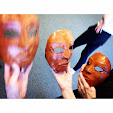
Available (and preferable) in French as Le Roi et l'Oiseau
Directed by Paul Grimault
Produced by André Sarrut
Color, animation, 63 minutes
Based on "The Sheperdess and the Chimney Sweep," by Hans Christian Andersen, adapted by Grimault and Jacques Prévert
Recommended for 8 and up
Astonishing for its inventiveness and surrealism, this odd and striking story may not be embraced by every child but is sure to give moments of delight. It goes by several titles and is available in both French and English; in this version, the title character, a despot-defying bird (who happens to be a doting single dad), is voiced hilariously by Peter Ustinov. A tyrant king, living in a castle high above his subjects, is in love with the portrait of a shepherdess, who comes to life from a painting. She and her true love, a chimney sweep, escape into a deserted city (picture Venice painted by de Chirico), and are then trapped in an underground kingdom where the king's subjects live without birds or sunlight. Full of surprises, amusements, and stunning animation. Apparently some have picked this gem up for a buck at WalMart, but greatly preferable: order the director's version, LE ROI ET L'OISEAU from Amazon.fr. The story easily survives a lack of subtitling, and kids deserve to see this level of cinematic art in the version intended by the creators. A few caveats: the king, who is both an object of fun and creepy, shoots bird for sport (though we don't see him kill one) and destroys his city with a giant waldo; there are moments of peril for major characters and the king dispenses with minor ones by pushing a button so they disappear through the floor or by having them flung aside by his robotic henchman. This is available in the English version on VHS from Facets for mail rental.


